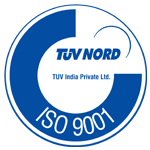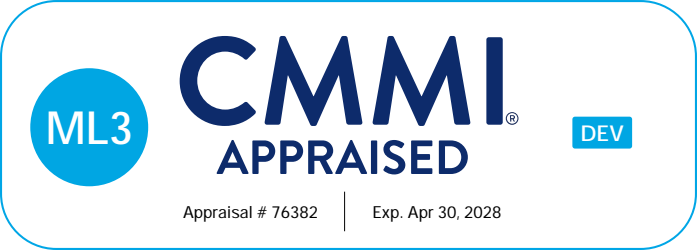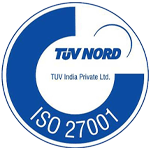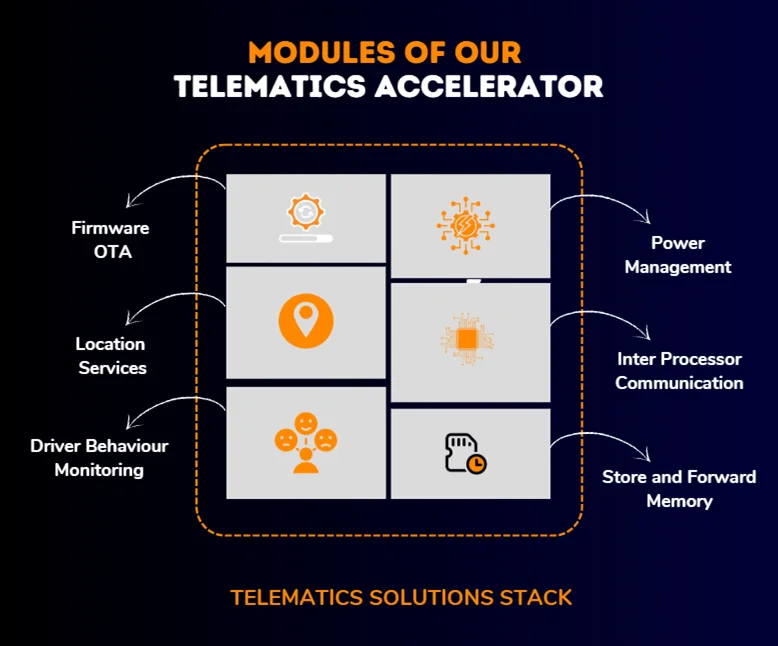
- Automotive & EV▼
- IoT▼
- Digital Solutions▼
- Industries▼
- Technology▼
- Digital Growth Enablers▼
- Commerce & Experience Services▼
- Success Stories▼
- Thought Leadership▼
- Industries
- AI/ML▼
- Company▼
- Careers▼
- Contact Us
- Blog






Embitel presents its Solution Accelerators, engineered to give you a head-start in developing connected vehicle systems.
After the success of our OTA Update Accelerator and Android Infotainment Accelerator, we proudly introduce our latest software development kit (SDK)—Telematics SDK.
Crafted by our expert IoT and automotive teams, Embitel’s Telematics SDK offers a robust foundation to develop telematics solutions for Software-Defined Vehicles (SDVs).
Our cloud-native, telematics SDK allows OEMs to develop one application layer code for their telematics apps that are used in Entry, Mid-Segment, and Top variants. Yes, our solution enables you to develop one code that runs everywhere.

Our comprehensive vehicle telematics development services give your brand a competitive edge. We offer solutions for the hardware and software development of telematics devices.
As an extension to this, embedded microservices such as our telematics SDK, open doors to 4 advantages for your telematics development team:
OEMs and developers can quickly integrate vehicle data, connectivity, and cloud services without developing from scratch.
Plug-and-play architecture allows easy adaptation to different vehicle models and uses cases
Supports multiple hardware and software ecosystems, including cloud platforms, edge computing, and embedded systems.
Ensures smooth interoperability with existing vehicle ECUs and IoT frameworks.
Shortens the R&D cycle and lowers development costs by leveraging pre-built functionalities. If a new version of hardware is released, all you need is minimal code modification.
Reduces the engineering efforts required for porting and maintenance.
Since the application layer code across the hardware SoC’s remains unchanged, it lowers the cost on regression testing activities.
Provides unified data models for vehicle telemetry, diagnostics, and analytics, ensuring consistency across different vehicle types.
Helps meet compliance standards through secure code and a secure review process.
The uniform interface provided by the platform abstraction layer (PAL) enables your team to reuse the same code to develop telematics applications for low, mid, and advanced level ECUs.
This helps you avoid vendor lock-ins.
Learn more about telematics here.
Developing applications for your car or fleet’s telematics control unit (TCU) from scratch is expensive and time-consuming.
Embitel’s telematics SDK is a collection of tools, documentation, and backward-compatible APIs to access the low-level driver’s features.
These telematics APIs assist in the faster prototyping & deployment of telematics applications by providing a pre-built framework to integrate core functionalities, such as –

The PM module in our telematics SDK monitors key power system parameters such as the vehicle's battery, engine RPM, and ignition status.
It intelligently transitions between 4 modes
Active, Standby, Sleep, and Hibernate
based on real-time analysis, optimizing performance and energy efficiency. ...
Key Features:
Designed to simplify the GPS integration process by robustly computing NMEA signal to location data with minimal integration complexity.
Whether you're building fleet management systems, navigation solutions, or IoT applications, our telematics SDK module ensures reliable GPS functionality tailored for diverse platforms. ...
Key Features:
Multi-processor communication is at the heart of modern telematics systems, and our Inter Processor Communication (IPrC) Module sets the standard for excellence.
With robust APIs and platform flexibility, IPrC makes it easier to achieve accurate and efficient data transfers of telemetric data in systems with centralized or zonal architectures. ...
Key Features Include:
Modern telematics demands precise monitoring of driver behaviour for enhanced safety and efficiency.
The Driver Behaviour Module of our telematics SDK accurately detects hard acceleration and braking events using an advanced machine-learning algorithm to analyze the continuous stream of data. ...
This algorithm provides data driven insights by analyzing driving patterns, fleet performance and predictive maintenance.
This makes our telematics SDK a must-have for private and commercial vehicles.
Our past experiences in developing driver monitoring solutions include
Key Features:
By ensuring reliable and ordered data delivery across any hardware or operating system, the store and forward memory (S&F) module buffers critical vehicle data during network loss and automatically forwards it once connectivity is restored. Using this, our telematics SDK ensures zero data loss, optimal bandwidth use, and dependable cloud synchronization across heterogeneous platforms in telematics solutions ...
Key Features Include:
Embitel’s software development kit for telematics supports OEMs in developing telematics applications for three categories of devices.
| Device Type | What do they do? | Hardware & Operating System (OS) |
|---|---|---|
| Low Range Telematics Device | Basic GPS tracker with 2G/4G LTE-M with minimal processing power. The functionalities of these devices are restricted to Location reporting and Asset Tracking for two-wheelers. |
Low-cost MCUs with No OS or Baremetal |
| Mid-Range Telematics Device | Full-feature OBD-II dongle or Telematics Control Units (TCU) with CAN data, accelerometer, Bluetooth Low Energy (BLE) and OTA update support. Fleet management devices and telematics systems in top-end two-wheelers and entry and mid-segment four-wheelers are an example of mid-range telematics devices. |
Mid-range MCUs with real-time operating systems (FreeRTOS). |
| High-range Telematics Device | Advanced Telematics Gateway Units (TGU) or TCU with 5G, Wi0-Fi, GNSS, Edge AI, automotive cybersecurity, and cloud integration. Automotive OEMs that choose to connect TCU/TGUs with the IVI module in premium vehicles are an example. |
System on chipsets (SoCs) that run advanced RTOS such as Linux OS or Android Automotive Operating System (AAOS) |
All you need to develop is one application layer code based on the APIs abstracted by PAL.
Embitel’s Telematics SDK is integrated with distinct modules powered by a reusable & customizable architecture.
The solution comes with extensive documentation about the SDK’s nitty-gritties. Our experts have crafted a full-fledged Doxygen documentation containing the following information:
This quickly provides your telematics target applications with a solid and mature foundation.
6
Modules with Code Reusability
50-70%
Reduced Time-To-Market

Key Highlights & Impact

Key Highlights & Impact
We are Focused on Developing Solutions that reduce time-to-market
We are Proud Practitioners Of Agile methodologies
1000+ Dedicated experts in delivering data-driven solutions
4.5 Rating on customer satisfaction scale!
80+ Tier-1 Customers
18+ Years of expertise in delivering custom automotive software